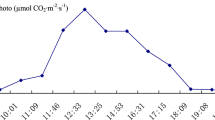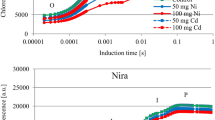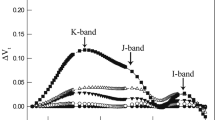Abstract
AN investigation of the variation of the oxidation-reduction potential in cases of iron deficiency or calcareous chlorosis has been made in an attempt to find a relation between the redox general condition, the formation of the chlorophyll complex and its stability.
This is a preview of subscription content, access via your institution
Access options
Subscribe to this journal
Receive 51 print issues and online access
$199.00 per year
only $3.90 per issue
Buy this article
- Purchase on Springer Link
- Instant access to full article PDF
Prices may be subject to local taxes which are calculated during checkout
Similar content being viewed by others
References
Rodríguez, C., et Díez-Altares, M. C., “Plant Ecology of the Montpellier Symposium, Ecologie vegetal”, Unesco, 89 (1955).
Heras, L., Anales estac. exp. Aula Dei (in the press).
Díez-Altares, M. C., Anales estac, exp. Aula Dei, 6 (1/2), 1 (1959).
Roach, W. A., Ann. Bot., N.S., 3, 155 (1939).
Author information
Authors and Affiliations
Rights and permissions
About this article
Cite this article
HERAS, L. Influence of Light Intensity on the Redox Potential in Leaves in cases of Iron-induced Chlorosis. Nature 188, 335–336 (1960). https://doi.org/10.1038/188335a0
Issue Date:
DOI: https://doi.org/10.1038/188335a0
This article is cited by
Comments
By submitting a comment you agree to abide by our Terms and Community Guidelines. If you find something abusive or that does not comply with our terms or guidelines please flag it as inappropriate.



